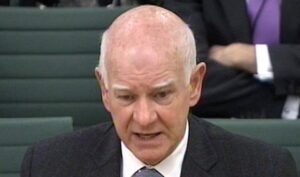The chairman of NatWest bank has argued that changes to the benefits system would be the most effective way for the government to help the poorest families struggling to cope with the cost of living crisis, instead of cutting taxes that also give the wealthy a financial boost.
Sir Howard Davies, a former deputy governor of the Bank of England, said soaring energy bills and rampant inflation were disproportionately affecting the poorest fifth of households and they should be the focus of financial support measures.
“The squeeze on living standards as a result of higher energy prices and higher food prices is really extraordinary,” he said. “If you look at what people would need to do on their discretionary spending in order to offset those increases it’s massive. The bottom 20% of the population, they would have to reduce their discretionary spending by 20% to stay even financially.”
Davies said it was difficult to compare the scale of the cost of living crisis in a historical context because Covid lockdowns put the brakes on a lot of household spending, which meant £280bn more in savings were built up compared with pre-pandemic and that was providing a “cushion of liquidity”.
He said those with savings were able to carry on their lifestyles – pointing to the boom in the holiday market – and that an across-the-board tax cut would be a “blunt instrument and very costly” and would also benefit those that don’t need it.
“I think what [the government] need to do is to look at the incidence of the problem and where the worst elements of the squeeze are taking place,” he told BBC Radio 4’s Today programme.
“The problem lies at the bottom end of the income distribution where those people don’t have savings for the most part and therefore they have no cushion to dip into. I would be focusing on the bottom 20% and seeing what can be done to help them through the benefit system … Tax cuts are difficult to target in quite the same way.”
While the bosses of Tesco and John Lewis have called for a windfall tax on the soaring profits at big energy companies, and Boris Johnson refused to rule it out on Thursday, Davies was cautious.
“If you can very clearly define what you mean by a windfall, so that people will see this as a genuine one-off that isn’t part of a longer-term tax burden on that set of companies then the arguments for it start to stack up,” he said. “Some of the past experiences of windfalls have simply raised the cost of capital for companies because people have said simply, ‘well, we can’t be sure we won’t have our profits taxed away in the future’. If you can genuinely isolate the circumstances and why these profits are made in this particular time then you have got a decent argument. I don’t know how to make that argument at this point.”
Davies, who advocated for a rise in interest rates last summer, said it was “unfortunate” the Bank of England did not move earlier to try to put the brakes on inflation, which is forecast to hit a 40-year high by the end of the year.
“The record of history shows that if you don’t get ahead of the game then you have to do more later,” he said, adding that he believed interest rates would have to rise further. “To some extent their anti-inflation work will be done for them. The higher energy prices in the end will squeeze other spending.”
Read more:
NatWest chair says best way to help poorest is through benefits
